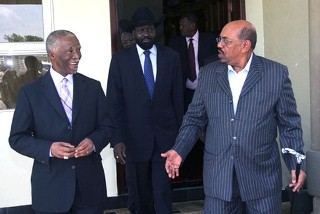AU calls for international support ahead of Juba – Khartoum talks
March 05, 2012 (KHARTOUM) – The African Union (AU) Commission chairperson on Monday urged the international community, including the United Nations (UN) and bilateral partners to support efforts by its High-Level Implementation Panel (AUHIP) in helping Sudan and South Sudan resolve all outstanding issues.

“The Chairperson of the Commission calls on the parties to seize the opportunity of the forthcoming negotiations to reach agreement on the outstanding issues, in line with the agreed principle of two viable states mutually supportive and living side by side in peace,” Ping said in the 5 March statement.
Both Sudan and South Sudan are due to resume talks on 6 March under the facilitation of the AUHIP, which is chaired by former South African leader, Thabo Mbeki.
The two neighbouring nations are currently involved in negotiations on several outstanding issues such as citizenship and nationality; border issues; as well as finance and other arrangements concerning the transshipment of South Sudanese oil through Sudan.
In January South Sudan, shut down its oil production countrywide after it accused Khartoum of illegally confiscating it crude oil, a decision Khartoum denies. The north says its actions were justified by South Sudan’s alleged failure to pay transit fees for oil passing through Sudan owned pipelines.
Ping called upon the two parties to approach the negotiation with the required spirit of compromise and mutual accommodation.
This is the latest in a series of talks which have, thus far, been unsuccessful.
According to Ping, a common commitment to “two viable states” is the only principle on which Sudan and South Sudan can achieve their respective national goals of development, democratisation and stability.
On the issue of citizenship and nationality, both countries have reportedly agreed to a “citizenship transitional period” that expires on 8 April, after which the status of nationals living in either country will have to be regularised.
However, as the AUHIP continues to engage both parties on the possibility of extending the transition period, Ping urges the two countries to scale up the issuance of identity documents to nationals of one country who reside in the other, or to facilitate the return to the country of origin for those who wish to do so.
“The Chairperson of the Commission calls upon Sudan and South Sudan to approach this issue in the spirit of African unity and solidarity, and with due respect to the rights of the populations concerned,” further reads the AU statement.
At least 700,000 South Sudanese are said to be living in Sudan alone.
Issues regarding the demarcation of the common border as well as resolution of the status of the disputed region of Abyei are also expected to be discussed between the two countries during the talks in Addis Ababa, Ethiopia.
Ping called upon Sudan and South Sudan to pay attention to Africa’s best practices in border management, and especially to uphold the principle of a soft border.
The two parties, he cautioned, should not interfere with existing patterns of migration, settlement and trade across the border.
South Sudan’s reaction
South Sudan on Monday maintained that it is committed to resuming discussions with neighbouring Sudan but that its demands remain for the need to strike a “fair” deal with Sudan prior to resuming production and exportation of oil through Sudan.
“We are ready to resume negotiations with Khartoum. Our delegation will tomorrow leave Juba to return to Addis to resume talks on the issues,” said Barnaba Marial Benjamin, South Sudan’s minister of information and broadcasting service.
Marial said his country would resume oil production only when a fair deal is reached with assurance that Khartoum will not renege on it.
(ST)
